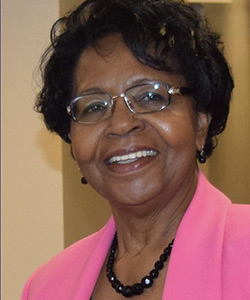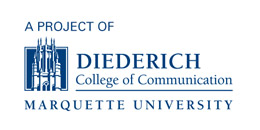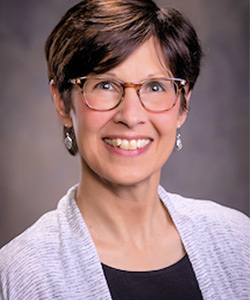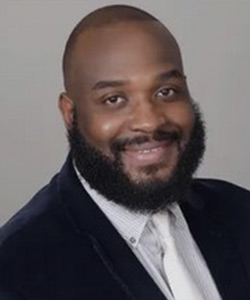
On Tuesday, voters head to the polls once again to vote for multiple races, including the Milwaukee Board of School Directors. Five of the nine seats on the school board are up for election.
Below are short biographies on the candidates as well as their answers to three questions about why they feel they are qualified and what they think about some of the school board’s current issues. The list excludes District 8, where Megan O’Halloran is running unopposed,
District 1
District 1 represents the city’s Northwest Side. Here’s a map of the district.
Incumbent Marva Herndon is running against Shandowlyon Hendricks Reaves to represent this district.
Herndon is a retired computer programmer and current representative of District 1.
Hendricks Reaves has held many school positions, including teacher, principal and administrator while also working at the Wisconsin Department of Public Instruction. She ran unsuccessfully for state superintendent in 2021.

Marva Herndon
Endorsements: Former Lt. Gov. Mandela Barnes, Former state Sen. Gary Goyke, state Rep. Evan Goyke, state Sen. Chris Larson, Milwaukee Alderwoman Marina Dimitrijevic, MPS Board President Bob Peterson, Milwaukee Alderman Jonathan Brostoff, MPS Board Director Erika Siemsen, MPS Board Director Megan O’Halloran, American Federation of Teachers Local 212, Amalgamated Transit Union Local 998, Black Leaders Organizing for Communities, Citizen Action, Fair Wisconsin PAC, International Brotherhood of Electrical Workers-Local 494, Milwaukee Labor Council-AFL-CIO, Shepherd Express, Milwaukee Teachers’ Education Association, UAW-Region 4, Wisconsin Working Families Party.

Dr. Shandowlyn Hendricks Reaves
Per the candidate on endorsements: “Voters are welcome to visit Shandowlyon’s social media pages: (1) Shandowlyon for MPS and (2) Friends of Shandowlyon to view endorsements that are posted daily.”
1. What are the most important issues in this election, and what is the difference between you and your opponent on these issues?
Herndon: The most important issue in this election is the survival of our “Public Schools.” Privatization is still in play. The big difference between us is the preservation of public education.
Hendricks Reaves: Improving student achievement, improving district culture/climate, addressing staffing shortages, and increasing transparency around operations and systems are the most important issues in the school board election. Shandowlyon is the only candidate with an educator-led 20-point policy to address student achievement and a “First 100-day plan” to address the other priorities.
2. MPS, as with many school districts throughout the state and country, is facing persistent teacher and staff shortages. MPS has tried to address this by offering hiring bonuses, reimbursing relocation costs for new teachers and utilizing emergency teaching licenses. Are there other ways to recruit and retain teachers that you believe should be implemented during your term?
Herndon: During my tenure on the school board, we have already put in place increased hiring efforts, especially (for) teachers of color. We have MPSU (MPS University) for assisting staff to attain degrees in education and mentoring/preparation for passing the exams required for certification. In addition, job openings are always posted, job fairs are frequent and the HR Department is traveling throughout the country, visiting HBCU’s (Historically Black Colleges and Universities) looking for new hires. The main problem, nationwide, is there are so few education candidates. The students are not choosing “Education” as a career path.
Hendricks Reaves: When serving at the Wisconsin Department of Public Instruction (DPI), Shandowlyon developed a statewide plan to address staffing shortages while simultaneously diversifying the teacher pipeline. Strategies in her plan were the result of collaborative efforts with multiple stakeholders at the national, state and local levels. Shandowlyon will draw upon strategies within that plan to address staffing shortages at MPS.
3. Within the first two months of your term, the school board will need to pass a budget for the 2023-’24 school year. What are priority additions to the budget for you, and what are you willing to cut in order to pay for those additions?
Herndon: My priority would be continued expansion of mental health services and improving our food services. We have expanded mental health services, but the need is great. The food services improvement has been provided in our budget for several years. However, due to the COVID-19 epidemic, staffing shortages and supply chain issues, this is not completed.
We have been made aware of a sizable budget shortfall and will not receive the proposed budget until the end of April. Our financial need is great as the state Legislature consistently cuts per pupil funding for public schools. In addition, they only fund special needs students at approximately 30% reimbursement. This is far from adequate to provide services for those needing the most. This requires reductions in other budget areas that are needed for the classroom, curriculum, building operations, etc. There is no wiggle room in our budgets. So, at this point, I don’t know what, if anything, I would be willing to cut.
Hendricks Reaves: Shandowlyon’s four priorities align with MPS’ legislative advocacy items. Shandowlyon will lead with a razor focus on allocating resources to address low student achievement. Only 14% of MPS students are proficient in reading and only 10% of MPS students are proficient in math. Shandowyon is willing to cut expenditures that fail to (1) yield higher academic achievement for students and (2) provide resources to parents, teachers, and administrators so that the district can engage in transformational change.
District 2
District 2 represents the city’s West Side, primarily between West Center Street and West Silver Spring Drive, west of North 60th Street. Here’s a map of the district.
Incumbent Erika Siemsen is running against write-in candidate Pamela Holmes to represent this district.
Siemsen is a retired teacher while Holmes is a retired sergeant at the Milwaukee Police Department.
1. What are the most important issues in this election, and what is the difference between you and your opponent on these issues?
Siemsen: As an advocate for early childhood (education), I support small class sizes and improving our resources for improving early literacy development. Improving the quality and variety of our school lunches is important to me, and I will continue to meet with students to see that those changes take place. I support expanding programs to give our children the tools they need to resolve conflict in a peaceful way through restorative practices and Social Emotional Learning opportunities. Above all, we must work to ensure that there is equity across the district so all students have every opportunity for success.
Holmes: Safety for all students and staff, focusing on the violence, the bullying and the mental health of all students and staff. What sets me apart from my opponent: I’m coming in the door talking about what it is that I’m going to do and that I know that we need for school. Lunch has been horrible for years and you pick election time to want to change school lunches, what about safety and the mental health and well-being of all of our students and staff?
2. MPS, like many school districts throughout the state and country, is facing persistent teacher and staff shortages. MPS has tried to address this by offering hiring bonuses, reimbursing relocation costs for new teachers and utilizing emergency teaching licenses. Are there other ways to recruit and retain teachers that you believe should be implemented during your term?
Siemsen: Improving our school climate and culture is another key factor in recruiting and retaining our staff. I have recently worked with administration to incorporate a shared/collaborative leadership initiative that will become part of the five-year strategic plan. I believe that when a school has a positive, collaborative working environment, where staff feels heard and empowered, they will want to stay at that school. As a district, that positive working environment will also attract new staff.
Holmes: You will have to make the school safe; that’s first and foremost for all students and staff. People do not care how much money you give them. No one will take that money if it meant losing a limb or a life. Make the schools safe and address mental health.
3. Within the first two months of your term, the school board will need to pass a budget for the 2023-’24 school year. What are priority additions to the budget for you, and what are you willing to cut in order to pay for those additions?
Siemsen: My budget priorities are improving nutrition, expanding programs related to social emotional learning, and attracting and retaining staff. Once the proposed budget is released, I will look at how those areas of need are addressed and look for opportunities to shift money to them if necessary. I have advocated for a priority-based budget that involves community input so important conversations can happen before the budget is released.
Holmes: I am willing to be part of the discussion to sell an empty MPS building to free up some funding to address the mental health crisis, the bullying and the violence in our schools so that we can focus on the budget and provide a curriculum for student achievement and a 20-point policy spearheaded by Dr. Shandowlyon Hendricks-Reaves.
District 3
District 3 represents part of the city’s North Side, roughly between West Center Street and West Silver Spring Drive, east of North 60th Street to Harambee. Here’s a map of the district.
Organizer Gabi Hart and businessman Darryl Jackson are running.
The seat is currently held by board Vice President Sequanna Taylor, who also serves on the Milwaukee County Board of Supervisors and did not file to run for re-election.
Hart is a community organizer who co-founded Program the Parks MKE and works with Milwaukee Turners on confronting mass incarceration.
Jackson is the vice president of business development at Brothers Infrastructure Group Construction.

Gabi Hart
Endorsements: Milwaukee Teachers’ Education Association, Leaders Igniting Transformation, Fair Wisconsin PAC, International Brotherhood of Electrical Workers-Local 494, Amalgamated Transit Union, former state Rep. David Bowen, MPS School Board Director and County Supervisor Sequanna Taylor, Emilio De Torre, state Rep. Darrin Madison, former Lt. Gov. Mandela Barnes, Vaun Mayes, Shepherd Express, Community Task Force MKE, Black Leaders Organizing for Communities, Wisconsin Working Families Party, Citizen Action, Alderman Jonathan Brostoff, V100.7 Program Director Reggie Brown.
1. What are the most important issues in this election, and what is the difference between you and your opponent on these issues?
Jackson: did not respond.
Hart: The most important issues are the ones that are directly tied to our students’ mental, physical and emotional well-being. Our children are failing, and we need to work smarter and faster at breaking through these statistics. Issues such as mental/behavioral health support, equity of resources all around, improving grades and learning environments, curriculum, uplifting our students’ voices, safety, corrective behavior practices, proper meals, teacher shortages and transportation to start. The difference between me and my opponent on these issues is threefold:
- I have a demonstrated passion for the flourishing of our youth in Milwaukee that has shown up time and time again in one-on-one assistance, participation in and leading large events around education, engaging families and communities as a whole, and youth empowerment.
- I acknowledge the office will require situational awareness and adaptation, so I will not handicap myself in those regards by trying to “answer correctly” but rather honestly.
- I am firmly against police being inside our schools. I also have experience addressing and helping people navigate issues outside of and in regards to MPS. I have a model and ideas on how to infuse those services and connections inside of MPS.
2. MPS, like many school districts throughout the state and country, is facing persistent teacher and staff shortages. MPS has tried to address this by offering hiring bonuses, reimbursing relocation costs for new teachers, and utilizing emergency teaching licenses. Are there other ways to recruit and retain teachers that you believe should be implemented during your term?
Jackson: did not respond.
Hart: I think we could and should consider taking emergency teaching licenses a step further by accepting qualified and passionate individuals with an associates degree and maintain focus and support on continuing education. This can serve as a form of indoctrination similar to how the health care field does with doctors and nurses. I also think paying local teachers more, having a safe and supported work environment, and many other things are key to retaining our dedicated educators and attracting new ones.
3. Within the first two months of your term, the school board will need to pass a budget for the 2023-’24 school year. What are priority additions to the budget for you, and what are you willing to cut in order to pay for those additions?
Jackson: did not respond.
Hart: Priority additions and adjustments revolve around wages, school nutrition, transportation, mental health, poverty aid, community engagement, continuing education and training for staff, safety and educational resources, i.e. supplies. Again, situational awareness, adaptation and transparency are key. I will make the most sound decisions based upon leaning on those with experience from guidance and more importantly what is presented by those most affected; the public school community (students, parents, educators) and the community as a whole.
At-Large District
The at-large seat represents the entire city. Anyone living in Milwaukee can vote for the race.
For the at-large seat, Missy Zombor and Jeff Spence are running to replace MPS Board President Bob Peterson, who did not file to run for reelection.
Zombor is the marketing director for Rethinking Schools and former communications director for the teacher’s union, Milwaukee Teachers’ Education Association.
Spence was formerly on the school board from 1999 to 2015 and now serves as a diversity, equity and inclusion officer at Milwaukee Metropolitan Sewerage District.

Jeff Spence
Endorsements: Former School Board Director Mark Sain, former School Board Director Bruce Thompson.
1. What are the most important issues in this election, and what is the difference between you and your opponent on these issues?
Spence: Student achievement across the entire city, regardless of where a young person is educated (traditional, charter, private). I am uniquely prepared to bring all sectors, partners together to improve educational achievement across the entire city, rather than looking at student achievement as a competition. Less than 20% of students in MPS are reading at grade level, less than 10% of students are on grade level in math. The clarion call should be that this is not acceptable, and that we can mitigate the social and emotional challenges to envision systems that lead to greater outcomes for all. My opponent is focusing more on inputs and a siloed approach to education, rather than systemic issues that limit our community’s success. I am better prepared in all facets (education, background, experience and relationships) to tackle these challenges.
Zombor: I am running for the MPS school board to ensure that every student has class sizes small enough for individual attention, amazing educators who are supported and respected, reliable transportation, nutritious school meals and an education that celebrates diversity. Every child –– regardless of their ZIP code –– has the right to attend well-resourced public schools with art, music, physical education, librarians, career education and extracurricular opportunities.
My opponent and I have opposing views on the MPS recreation program, school privatization and local control of our public schools. I am a strong supporter of the Milwaukee Recreation program and believe that the programs offered to MPS students, families and community members improve academic achievement, reduce crime, and strengthen our community. MPS facilities should continue to be used for this vital community service.
I also believe that public education is a civil right and public responsibility and that further privatization of our schools –– whether through expanding vouchers or co-locating charter and MPS schools in the same building –– deepens those inequities. I believe in local control of our public schools, and that every voting seat on the school board should be democratically elected by residents. I oppose public school takeover schemes, and therefore I am opposed to adding unelected, appointed seats to the school board.
2. MPS, like many school districts throughout the state and country, is facing persistent teacher and staff shortages. MPS has tried to address this by offering hiring bonuses, reimbursing relocation costs for new teachers, and utilizing emergency teaching licenses. Are there other ways to recruit and retain teachers that you believe should be implemented during your term?
Spence: MPS had a program in the early 2000’s (MTEC) that helped elevate educational assistants and individuals with college degrees, but no teaching credentials, become certified teachers. We can also effectively recruit and retain talent by creating a culture where there are clear and consistent expectations for all employees and demonstrated systems to support success, whether you are a teacher, administrator and, of course, students. We as a community must respect, support and value noble professions that are committed to serving our community (teachers, safety personnel, etc.), while holding all accountable.
Zombor: There’s an alarming number of educators leaving the teaching profession and fewer people entering teacher certification programs. MPS needs to do more to support teachers to make the profession less stressful and give them the compensation they deserve. MPS can do this by protecting and expanding teacher prep time – especially for special education teachers, offering bonuses for educators who stay in the district, making our schools more peaceful, providing health insurance benefits to all full-time substitute teachers, and reducing class sizes. The district can also strengthen support for “grow your own” programs for aspiring teachers who already work in the district. MPS should also speed up the hiring process to ensure that we’re not losing educators to other districts.
3. Within the first two months of your term, the school board will need to pass a budget for the 2023-’24 school year. What are priority additions to the budget for you, and what are you willing to cut in order to pay for those additions?
Spence: The 2023-24 budget will be essentially completed by the time new board members are elected, with little room for additional initiatives. I would focus my efforts on changing the governance model, adding seats for the Mayor of Milwaukee and the County Executive with the goal of visioning more collaborative support systems for all students to maximize the city’s effectiveness in supporting its youngest citizens. I would begin the hard work of rightsizing the number of schools we’re programming, as falling birth rates and parents utilizing other options challenge our ability to properly resource school communities at a level that ensures success. I would also work to bring back the many partners that have walked away from an organization that’s shown little interest in fundamentally changing its approach to achieve greater outcomes.
Zombor:
- Attract and retain amazing education professionals: I believe that educators and support staff deserve substantial raises and competitive salaries.
- Smaller class sizes: MPS class sizes are also among the highest in Wisconsin. Educators need class sizes small enough to provide individualized attention to every student. I support a budget that ensures the lowest class sizes possible – especially in early grades.
- Stronger enrollment supports: Families who choose MPS often find the enrollment and school selection process confusing and difficult to navigate. There are over 130 MPS schools, and families don’t always know about all the amazing school offerings MPS has. We need to ensure that every family that chooses MPS can enroll in MPS with ease, has answers to their questions and is matched with schools that have the services and programs they want for their child. If successful, this budget item could pay for itself.
- Improving transportation services: I would like to see MPS install GPS tracking apps that enable families to see the location of their child’s bus on a smartphone or computer. The app will improve communication between MPS families and staff regarding the safety and well-being of students.
We cannot balance the budget on the backs of education workers or make cuts at the school level. We have to look at excessive layers of administration and reduce the number of exception-to-bid contracts the district engages in. MPS also shouldn’t be footing the bill for schools it doesn’t operate. We need to ensure that privately operated charter schools pay their fair share of administrative fees and fair lease agreements.










thank you for the information
This website is a treasure trove of information. I’ve bookmarked it for future reference.
Woah, this is something amazing that you have shared here
I just came to this blog for the first time, and I am very interested in the information presented, I will come back another time